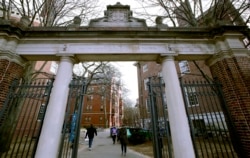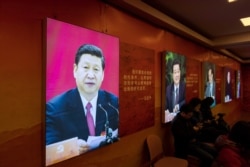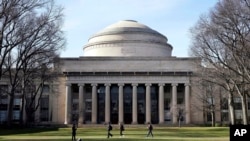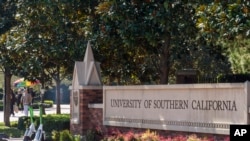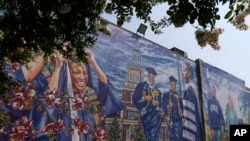Student Union
Chinese Law Professor Fired for Views Receives Harvard Job Offer
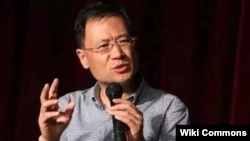
Outspoken Chinese legal scholar Xu Zhangrun has received an invitation from Harvard University to be a researcher at the school's Fairbank Center for Chinese Studies (FCCS), weeks after being fired by his former employer, Tsinghua University, for articles critical of President Xi Jinping.
According to friends, Xu received an unofficial invitation from Harvard on August 7; on August 13 he received an official FCCS offer letter as an associate in research for the 2020-21 school year.
"We have much respect for Professor Xu's academic work," James Evans, the center's communications officer, told VOA's Mandarin service via email. "We thought it appropriate to make a gesture of support in light of recent developments, and therefore invited him to apply for an affiliation with us."
While the associate-in-research affiliation is ordinarily granted in response to a request by the scholar, Evans said FCCS found "it would be an effective way to express support for Prof. Xu in a timely fashion."
Xu wrote back to the center on Wednesday, thanking FCCS for the offer, saying it was "a substantive appointment that addresses the very core of my interests."
Just days ago, Xu received the Notice for Unemployed Individual from his former employer, the prestigious Tsinghua University, officially finalizing termination of his contract. In addition to writing critical articles, Xu was detained for a week in early July on charges of soliciting prostitutes in the southwestern city of Chengdu last year, which he denied.
Xu, who was barred from leaving China, had taught at Tsinghua University's law school for over two decades. In a series of articles published over the past few years, Xu has harshly criticized Xi, accusing him of moving toward authoritarianism since coming to power in 2012 and blaming him for China's political, economic and cultural setbacks.
Observers cheer Harvard
Professor Jerome Cohen, founder of New York University's U.S.-Asia Law Institute, called Harvard's invitation to Xu "a brilliant move" that raises the question of whether other research organizations should also extend invitations to rights activists in China.
"I have long thought that I should limit my contacts with distinguished human rights people in China, because it might add to their problems," Cohen told VOA Mandarin.
"But I see now, perhaps we should take the opposite approach and we should be inviting many of the great people in China who are oppressed or restricted in their activities to be associated with our research institutes," he said. "I see what it has done for Professor Xu. He has put out a wonderful, extremely interesting essay in response to the honor Harvard extended to him. It is obviously a psychic income. It has given him greater resistance and greater strides in his struggle against oppression."
Boston University political scientist Joseph Fewsmith, also an FCCS researcher, told VOA the Harvard center has a history of providing shelter for oppressed scholars, and that he welcomes Xu's arrival.
Chinese legal scholar Yu Ping said the move shows that Harvard's relationship with Beijing is evolving.
"They stood up to the CCP at such a critical moment, I think it shows their dissatisfaction with CCP's punishment towards Xu," he told VOA. In the past, he said, FCCS was sometimes reluctant to engage in political debates that could disrupt its relationship with Beijing, and the public support for Xu shows "a change of attitude."
Yet Lu Nan, a U.S.-based political commentator who is friends with Xu, said the Beijing authorities will not allow Xu to leave the country.
"I am 100% sure Xu's freedom of movement will be controlled," Lu told VOA. "Xu knows this — he can't physically leave China."
Recently, many liberal scholars have been forbidden to leave China. In 2018, Hong Sheng, director of the liberal think tank Unirule Institute of Economics, was told at the airport that he was not allowed to leave China to attend a conference in the U.S. on China's economic reform. The reason given to him was that the trip "threatens China's national security."
Lu added that he expects Xu will not give in to the authorities and is prepared for further persecution.
This story originated in VOA's Mandarin service.
See all News Updates of the Day
Malaysian official: Schools can’t turn away from global tensions
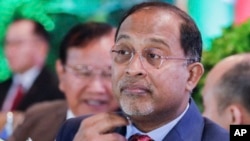
Zambry Abdul Kadir, Malaysia’s higher education minister, said protests spreading across universities in the United States show that schools can’t ignore political tensions.
Helen Packer, reporting in Times Higher Education, said the minister reminded educators that universities are key in the development of leaders, individuals and societies. (April 2024)
Social media breaks are difficult, but necessary

Between online classes, maintaining social connections and working on projects, college students can have a hard time disengaging from the demands of technology.
In Florida International University’s PantherNOW, Ariana Rodriguez offers strategies for taking a break from social media. (April 2024)
- By Melos Ambaye
Many master's degrees aren't worth the investment, research shows
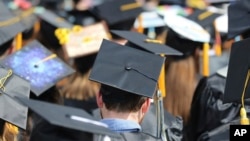
Nearly half of master's degrees have a negative financial return, according to new research by the Foundation for Research on Equal Opportunity, an economic research organization.
The study indicates that many graduate degree programs do not increase lifetime earnings enough to be worth it.
While 23% of bachelor’s degree programs yield a negative financial return on investment, 43% of two-year degrees and master’s degrees fail to deliver a return, according to the study by Preston Cooper, a senior fellow at FREOPP.
Cooper assessed the return on investment for 53,000 degree and certificate programs to determine whether a student’s lifetime earnings outweigh program costs and the risk of not completing their degree.
His findings show that a student’s field of study was the overriding indicator of return on investment at the undergraduate and graduate level.
Engineering, computer science and nursing bachelor’s degrees have high financial returns on investment, while programs in education, fine arts, psychology and English usually have low returns.
Graduate degrees in medicine and law tend to have strong payoffs. But a large share of master’s programs, including the MBA, frequently have low payoffs, according to Cooper.
Although workers with master’s degrees earn 16% more than those with only bachelor’s degrees, Cooper says the figure fails to account for students who had “higher preexisting earnings potential.”
“MBA students typically have high preexisting earnings potential, having often chosen high-ROI undergraduate majors such as finance and economics,” Cooper writes. “So the MBA adds little value on top of that.”
The study indicates that high starting salaries are predictors of high returns on investment. Degrees with starting salaries of $57,000 a year or more deliver the best lifetime returns.
But the return on investment of a degree can vary depending on the educational institution.
“Students interested in fields with low average pay can still find some schools that do well transforming those fields of study into high-paying careers,” Cooper writes.
The quality of an institution also matters, said William Tierney, professor emeritus of higher education at the University of Southern California.
“An MBA from Harvard is a likely ticket to a good job,” Tierney told VOA. “An MBA from the University of Phoenix, less so.”
But students pursue graduate programs for more than just financial reasons.
“Some degrees open up careers in fields that students may enjoy, such as in the performing arts,” Robert Kelchen, head of educational leadership at the University of Tennessee, Knoxville, told VOA.
“Others can help gain access to social networks or simply help students learn about a topic that is of interest,” Kelchen added.
Cooper told VOA that it might make sense for students in degree programs with low returns on investment to switch majors if they can still graduate on time.
He found the worst outcome for a student’s return on investment is dropping out of college “because they must pay for one or more years’ tuition and spend time out of the labor force.”
Lawmakers who fund higher education have a responsibility in ensuring “higher education delivers on its promise of economic mobility,” Cooper said.
Nearly a third of federal funding, including Pell grants and student loans, pays for higher education programs that fail to provide students with a return on investment, according to the study.
Cooper’s view is that “some schools should shut down low-ROI programs and reallocate institutional resources to programs with a better return.”
“There's definitely this narrative out there that higher education is always worth it, and you should always try to get that extra degree because it will increase your earnings,” he told VOA. “That's reinforced by colleges who make lofty promises regarding their graduate degree programs' outcomes, which all too often fall short.”
Harvard students end protest as school agrees to discuss Gaza conflict
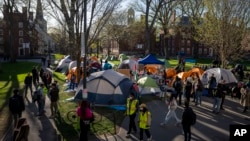
Protesters against the war between Israel and Hamas were voluntarily taking down their tents in Harvard Yard on Tuesday after university officials agreed to discuss their questions about the endowment, bringing a peaceful end to the kinds of demonstrations that were broken up by police on other campuses.
The student protest group Harvard Out of Occupied Palestine said in a statement that the encampment "outlasted its utility with respect to our demands." Meanwhile, Harvard University interim President Alan Garber agreed to pursue a meeting between protesters and university officials regarding the students' questions.
Students at many college campuses this spring set up similar encampments, calling for their schools to cut ties with Israel and businesses that support it.
The Israel-Hamas war began when Hamas and other militants stormed into southern Israel on October 7, killing some 1,200 people and taking 250 hostages. Palestinian militants still hold about 100 captives, and Israel's military has killed more than 35,000 people in Gaza, according to Gaza's Health Ministry, which doesn't distinguish between civilians and combatants.
Harvard said its president and the dean of the Faculty of Arts and Sciences, Hopi Hoekstra, will meet with the protesters to discuss the conflict in the Middle East.
The protesters said they worked out an agreement to meet with university officials, including the Harvard Management Company, which oversees the world's largest academic endowment, valued at about $50 billion.
The protesters' statement said the students will set an agenda that includes discussions on disclosure, divestment, reinvestment and the creation of a Center for Palestine Studies. The students also said that Harvard has offered to retract suspensions of more than 20 students and student workers and back down on disciplinary measures faced by 60 more.
"Since its establishment three weeks ago, the encampment has both broadened and deepened Palestine solidarity organizing on campus," a spokesperson for the protesters said. "It has moved the needle on disclosure and divestment at Harvard."
Chinese students report interrogations, deportations at US airports
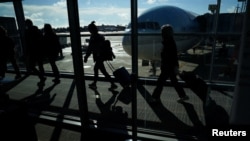
Academics from China are reporting increased scrutiny at U.S. airports, with valid visa holders being interrogated and turned away by Customs and Border Protection Agents.
Phones and laptops have been searched, and researchers have undergone extensive questioning about their work. One graduate student at Yale, who was midway through her PhD, was turned back at Dulles airport and banned from entering the U.S. for five years, according to The Guardian.




